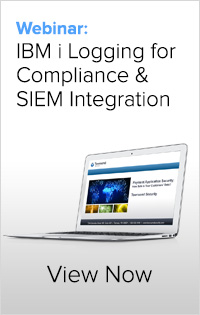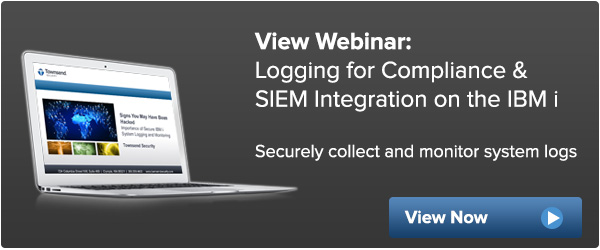Our Alliance LogAgent customers often ask us which IBM i security events we transmit from the IBM security audit journal QAUDJRN to their log collection server or SIEM solution. There are several factors that affect which security events get collected by the IBM i operating system, and even which events are collected by Alliance LogAgent for transmission to your SIEM server. Let’s take a look at these:
 When your new IBM i server is delivered it is not configured to collect any security events. You must create the QAUDJRN journal and the journal receiver as a first step. Then you must change some system values in order to activate security event collection. This is the first step in answering the question about which security events Alliance LogAgent transmits. It can only transmit the events you enable and you set these with the system values.
When your new IBM i server is delivered it is not configured to collect any security events. You must create the QAUDJRN journal and the journal receiver as a first step. Then you must change some system values in order to activate security event collection. This is the first step in answering the question about which security events Alliance LogAgent transmits. It can only transmit the events you enable and you set these with the system values.
The first system value you must set is QAUDCTL. When you receive your new IBM i platform this system value is set to *NONE meaning that no security events are collected. You should probably change this to:
*AUDLVL
*OBJAUD
*NOQTEMP
You now need to set the QAUDLVL and QAUDLVL2 system values to specify the type of events you want to collect. On a new IBM i server these system values are blank. IBM makes it easy to collect the security events through a special system value named *SECURITY. If you set the QAUDLVL system value to *SECURITY you will collect only the security-related events on the IBM platform. Of course, there are other events that you might like to collect. Press the F1 help key to view a complete list of events. If they won’t all fit in the QAUDLVL system value just add them to the QAUDLVL2 system value and specify *AUDLVL2 in the list.
You can now use the Change User Audit (CHGUSRAUD) command to audit users. I would suggest you turn on full user auditing for any security administrator, any user with All Object (*ALLOBJ) authority, and any user with audit (*AUDIT) authority.
You can also turn on object level logging with the Change Object Auditing (CHGOBJAUD) command. Be sure to specify all libraries and files that contains sensitive data. Do the same thing for IFS directories using the Change Audit (CHGAUD) command.
You’ve completed the first step in configuring security event collection. Alliance LogAgent can only report what you configure the system to collect and this first step defines those events.
Alliance LogAgent can also be configured to filter security events. The default is to report all of the events collected in the system audit journal QAUDJRN, but you can narrow these to a defined set of events. In the Alliance LogAgent configuration menu you will see an option to Work With Security Types. This will list all of the event types collected in the QAUDJRN journal. You can use function key F13 to set group patterns, or change each event. The F13 option is nice because it has a *SECURITY option that will let you set all security events on for reporting. Or, you can edit an individual security event to change its reporting status. For example, to turn off reporting of Spool File actions, edit the SF event and change the reporting option to No:
Send to log server . . . . . . . 2 1=Yes, 2=No
When you make this change Alliance LogAgent will no longer send spool file action information to your SIEM solution.
It is not wise to turn off the reporting of security events in Alliance LogAgent! You will always want to collect and report these events.
Setting the system values and configuring Alliance LogAgent security events are the primary ways you determine which events are transmitted to your log collection server. There are additional filtering options in Alliance LogAgent to include or exclude objects, IFS files and libraries and these can help you further refine the events that are transmitted.

